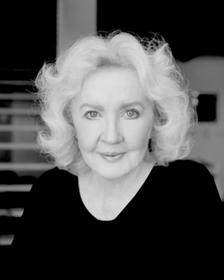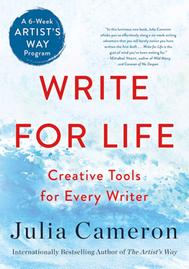
|
|
| (photo: Robert Stivers) | |
Julia Cameron started a movement with the 1992 publication of The Artist's Way. A generation of writers, singers, painters as well as CEOs found the tools to become unblocked and begin creating. Shelf Awareness spoke to Cameron by phone from her home in the mountains of Santa Fe, N.Mex., about her new book, Write for Life (St. Martin's Essentials), a six-week course aimed at writers--to get them going, keep them going and coax them to completion.
How did you come to develop "Morning Pages," the three pages a day that you introduced in The Artist's Way and that also play a key role in Write for Life? Did you call them "Morning Pages" from the beginning?
My daughter was two years old, and I was writing quickly, before she got out of bed [and that came to about three pages]. The name "Morning Pages" developed as I was writing The Artist's Way.
What was the origin of the "Artist's Date"--a tool you also suggest in Write for Life? I must confess I've written Morning Pages consistently since receiving The Artist's Way as a gift in 1993. The Artist's Date... not so much. Is that kind of resistance to the Artist's Date true for many of the people you've worked with over the years?
The "Artist's Date" was part and parcel of when I started teaching. We need an adventure. When I'm teaching, I say, "I have a tool." You'd think it's a nightmare to get up 45 minutes early to work on creativity [with the "Morning Pages"], but the first week I tell them to "go play" [on an "Artist's Date"], they fold their arms skeptically: "What does play have to do with working on creativity?" Resistance is common and painful.
At what point did you start sharing these two cornerstones of The Artist's Way with others?
I shared each quickly, upon discovering it. I came from a big family. We'd learn to lace up our ice skates, then we'd turn and teach a sibling. When I started Morning Pages, I had friends who were blocked, and I said, "Try writing three pages a day," and they got unblocked.
 In Write for Life, some of the tools you mention also appear in The Artist's Way. But in Write for Life, in the context of "coaching" people who are actually attempting to write a book, they take on deeper meaning--they become remedies for specific problems.
In Write for Life, some of the tools you mention also appear in The Artist's Way. But in Write for Life, in the context of "coaching" people who are actually attempting to write a book, they take on deeper meaning--they become remedies for specific problems.
I wanted to record all the tips and tricks I'd learned in 55 years as a writer--not just for blocked writers but for those who want to write more swiftly. A book appropriate for seasoned writers as well as novices.
You call "punctuality and perfectionism" the "twin demons," when referring to a friend who is a journalist. You yourself wrote for magazines for many years. Was it difficult to shrug off that kind of deadline-oriented mentality for the "gentleness" you advocate when writing a project at a three-pages-a-day pace?
I hope that I'm gentle but firm. The training of journalism was very important for me; it taught me that deadlines could be friendly as well as harsh.
And let's be clear: the three pages daily that you advocate for the writing project are in addition to the three stream-of-consciousness Morning Pages.
For the Morning Pages, it's as if you have ADD--you skip from topic to topic.
For the project, you have a focus, a goal in mind. As you lay track, it's to a purpose. Morning Pages are more frivolous. They set you up for guidance. It's very common to have a focused thought after your three Morning Pages; something will come to you. These can be a launching pad for further work on your project.
You note that people often struggle at the 1½-page point with the Morning Pages, and also that people might be struggling when they hit week four or five, as they approach the finish line of this six-week course to complete a project. Do people often give up at the halfway point?
At the halfway point, I need to give strength to writers; if they've done the tools of the first three weeks, I want to coax them along. Media deprivation--like the Artist's Date--meets with resistance. If they do it, they're rewarded by a flow of words.
You've named your inner critic Nigel, as a way to rein him in. In your experience, do you observe people struggling more with their inner critic or outer critics? Or does the outside critic become that internal critic?
I think people have an inner critic that bedevils them throughout their writing careers. An outer critic comes along as you finish a project. The two can say the same thing, and then it's worth listening to. I recently had a reviewer say, "Julia's tools are simple and repetitive." I think I was supposed to be insulted. But I was delighted.
One of the things I thought about while writing this book is that writing is a spiritual path. I hope I'm giving them enough that they'll let their resistance drop.
You talk about setting a reasonable daily quantity for one's project--roughly three pages. When you, Julia, have come to the end of your quantity for the day, do you, as Hemingway did, give yourself the kindness of leaving yourself a place to begin the next day? Or do you stop where you've told yourself to stop.
I stop where I told myself to stop. Then I practice "Grabbing Time" [another tool in Write for Life] and look for first thoughts when I can that day. If you notice, there are many short essays in Write for Life.
In The Artist's Way, you talk about the importance of circling back around and seeing things from a different vantage point. Your Check Ins often repeat the same questions. Is this to encourage readers to develop a practice?
Check Ins I developed with my friends. When I got sober, I found myself surrounded by people who were blocked. I'd ask them, "Did you do your Morning Pages?" I'm a coach for people. I hope to be tenderhearted. Gentle reminders, simple tools do pay off. The stories I share about people who've had success attest to that.
In Week 6, you address a project's overall structure, thinking of it in thirds. Is this something you do yourself after you've done a draft? Or is it so ingrained that you do this structuring almost without thinking?
When you write something, it has a notion for the right shape for itself that you can depend on. It doesn't do much good to be too intellectual. Finding the inner pattern of a piece is something that writers discover with some surprise. --Jennifer M. Brown, senior editor, Shelf Awareness

